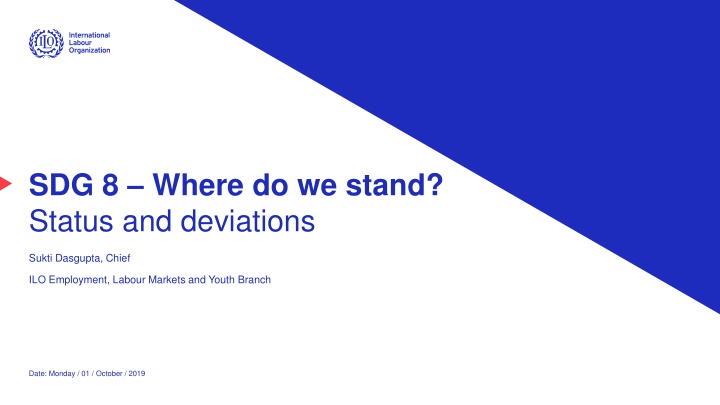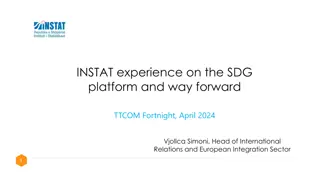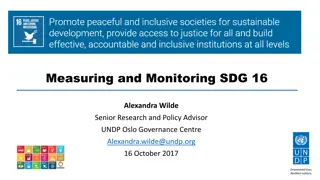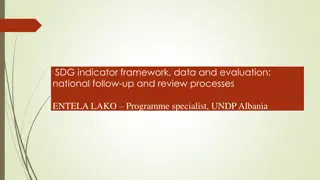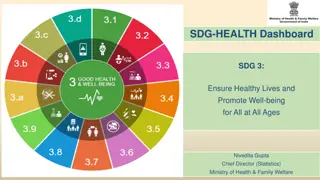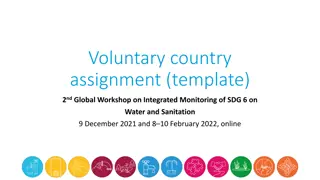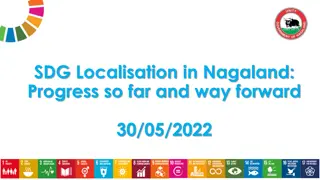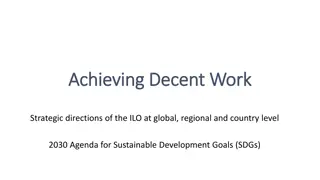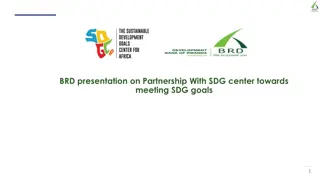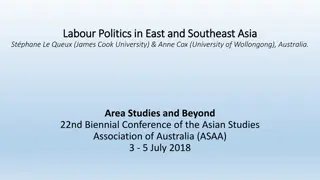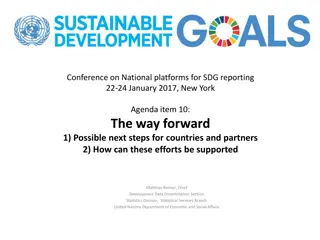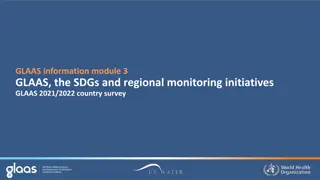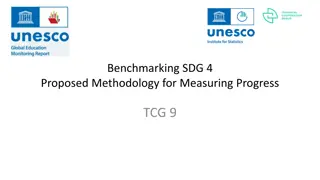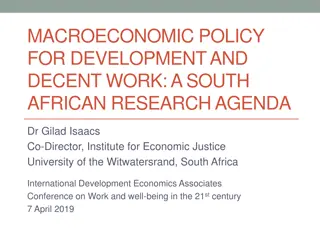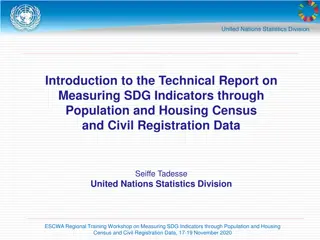Status of SDG 8: Challenges and Progress in Promoting Sustainable Economic Growth and Decent Work
SDG 8 aims to promote sustainable economic growth and decent work for all, but progress has been disrupted by the severe economic impacts of the COVID-19 pandemic. Unemployment rates have increased globally, with particular concerns about informal employment and gender equality. There has been slight progress in labor rights compliance, but challenges remain in achieving social justice and decent work.
Download Presentation

Please find below an Image/Link to download the presentation.
The content on the website is provided AS IS for your information and personal use only. It may not be sold, licensed, or shared on other websites without obtaining consent from the author.If you encounter any issues during the download, it is possible that the publisher has removed the file from their server.
You are allowed to download the files provided on this website for personal or commercial use, subject to the condition that they are used lawfully. All files are the property of their respective owners.
The content on the website is provided AS IS for your information and personal use only. It may not be sold, licensed, or shared on other websites without obtaining consent from the author.
E N D
Presentation Transcript
SDG 8 Where do we stand? Status and deviations Sukti Dasgupta, Chief ILO Employment, Labour Markets and Youth Branch Date: Monday / 01 / October / 2019
2 Introduction SDG 8: Promote sustained, inclusive and sustainable economic growth, full and productive employment and decent work for all . Some progress made. However the severe economic and employment impacts of COVID-19 pandemic have seriously disrupted gains achieved. Advancing social justice, promoting decent work
3 Unemployment had been increasing in upper middle-income countries even prior to COVID-19 Globally unemployment rates had been falling between 2015 and 2019. 7.0 6.5 Reduction in unemployment rates in high income countries. 6.0 In upper middle-income countries, unemployment rates had been on the rise even prior to the COVID-19 pandemic. 5.5 5.0 Global unemployment increased by 33 million in 2020, with the unemployment rate increasing by 1.1 percentage points to 6.5 per cent. 4.5 4.0 Female unemployment rates are slightly higher than for men in 2019, 5.5% vs. 5.3 %. 2015 2016 2017 2018 2019 2020 World Low income Lower-middle income Upper-middle income High income
4 Informal employment remains a concern 100% Total Agriculture Non-agriculture Prior to the pandemic, the informal employment share was 60.2 per cent of global employment. Regional variations. 89 percent for LDCs. 90% 80% 70% 60% 50% About 2 billion people worked in the informal economy. 40% 30% 20% 10% Particularly worrisome in least developed countries, where the share of informal employment in total employment was 88.7 per cent (2019). 0% World Australia and New Zealand Central Asia and Southern Asia Sub-Saharan Africa Least Developed Countries (LDCs) Landlocked developing countries Eastern Asia and South-eastern Western Asia and Northern Africa Latin America and the Caribbean Small island developing States Northern America and Europe (SIDS) (LLDCs) Asia Severely affected by current crisis. Advancing social justice, promoting decent work
5 SDG 8.8.2: Level of national compliance with labour rights (freedom of association and collective bargaining) Slight progress under SDG indicator 8.8.2 at the global level. Several countries carrying out important changes in legislation. Violations of workers and employers right to organize and bargain collectively remained significant in 2018. Advancing social justice, promoting decent work
6 Some progress on gender equality prior to the pandemic Women are under-represented in managerial positions (SDG 5.5.2) . By 2019, even though women accounted for nearly 39 per cent of the global labour force, they occupied only 28.2 per cent of managerial positions. Female earnings as a percentage of male earnings: simple average 96% 100% 93% 90% 87% 90% 80% 72% 70% Female workers still earn significantly less than male workers throughout the world (SDG 8.5.1); above-all in low income countries. 60% 50% 40% 30% 20% Women have been hard hit by the crisis and were more likely than men to become inactive, further increasing gender gaps in labour force participation rates. 10% 0% World Low income Lower-middle income Upper-middle income High income Advancing social justice, promoting decent work
7 Youth- NEET rates had been increasing in some regions, even prior to the COVID-19 pandemic (SDG 8.6.1) Globally, the share of young NEET had remained stable between 2015 and 2019. 35 This reflected falls in Europe and the Americas, on the one hand; 30 25 And an increase in Africa and most markedly Arab States on the other. 20 15 Young females are more than twice as likely as men to be NEET - in 2019 were 31.1% for young women and 14% for young men. In lower middle- income countries almost of NEETs are female. 10 2015 2016 2017 2018 2019 World Africa Americas Arab States Asia and the Pacific Europe and Central Asia NEET rate likely to rise due to Covid 19.
8 8.b.1: Existence of a developed and operationalized national strategy for youth employment, as a distinct strategy or as part of a national employment strategy . Data on indicator 8.b.1 continues to show the commitment of countries for youth employment (90 of 107 responses). Countries by value of SDG Indicator 8.b.1 in 2020 (%) A third (33) have formulated and operationalized a national strategy for youth employment. A jobs and skills policy mis- match! 1% 24% 31% Most countries have skills policies , very little on jobs for youth. 41.1% of them (44) have such strategies but no conclusive evidence on implementation. 44% Strategy formulated and operationalized Strategy formulated but no evidenve of operationalization A quarter (27) are in the process of formulating a strategy. Strategy in the process of development No strategy
9 Covid 19 impact - Unprecedented and devastating * Four time larger than in the Great Recession (2008) Global labour income is estimated to have declined by 8.3 per cent in 2020 relative to 2019. Advancing social justice, promoting decent work
10 The COVID-19 crisis has dealt a serious blow to achieving SDG 8 Severe job loss leading to growth in unemployment and inactivity, and loss of labour income. The impact has been more severe for women, youth, and vulnerable groups. Labour market inequality has increased. The regional picture is quite varied: advanced countries are recovering , but developing countries including many upper middle-income countries, still in crisis. Impact on SDG 8 likely to affect other SDG indicators, especially SDG 1 (poverty), 2 (hunger) 5 (gender), 10 (inequality).
11 Thank you. Advancing social justice, promoting decent work
12 Significant progress has been made in reducing working poverty Prior to the COVID-19 pandemic, the share of the world s workers living below the poverty line had decreased significantly from 26.2 per cent in 2000 to 6.6 per cent in 2019 showing encouraging progress towards the achievement of SDG Goal 1 to end poverty in all its forms everywhere. 70% World Least Developed Countries (LDCs) 60% Landlocked developing countries (LLDCs) Sub-Saharan Africa Oceania excluding Australia and New Zealand Central Asia and Southern Asia 50% 40% 30% 20% 10% 0% 2000 2001 2002 2003 2004 2005 2006 2007 2008 2009 2010 2011 2012 2013 2014 2015 2016 2017 2018 2019 Advancing social justice, promoting decent work
